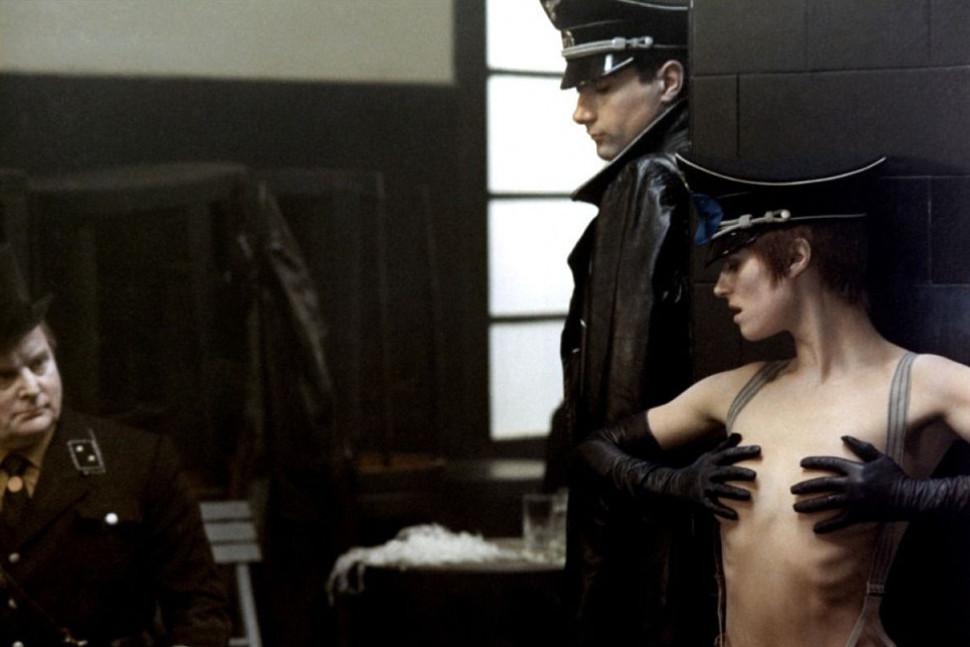| Director: | Liliana Cavani |
|---|---|
| Production: | Lotar Film |
| Running Time: | 120’ |
| Language: | English |
| Country: | Italy |
| Year: | 1974 |
| Main Cast: | Dirk Bogarde, Charlotte Rampling, Philippe Leroy, Gabriele Ferzetti, Nora Ricci, Isa Miranda, Giuseppe Addobbati, Amedeo Amodio, Marino Masé |
| Screenplay: | Liliana Cavani, Italo Moscati |
| Cinematographer: | Alfio Contini |
| Editor: | Franco Arcalli |
| Production Designer: | Jean-Marie Simon, Nedo Azzini |
| Costume Designer: | Piero Tosi |
| Music: | Daniele Paris |
| Sound: | Eugenio Rondani, Decio Trani |
| Restoration: | CSC – Cineteca Nazionale, Istituto Luce - Cinecittà |
| Notes: | 14+ |
Il portiere di notte (The Night Porter)

Synopsis
Vienna, 1957. In a “fin-de-siècle” hotel Max, the night porter, recognizes one of the guests, the wife of a conductor, Lucia, as the teenage girl whom he had met fifteen years earlier in a Nazi concentration camp. Max had been an officer in the SS and had formed a sadomasochistic relationship with the girl, a mixture of tenderness and profound cruelty, characterized by a murky but deeply-felt complicity. Lucia too has recognized Max, and fatally, partly as a result of exceptional circumstances, the relationship between the two of them, between victim and tormenter, is formed again. Among other things Max wants to avoid Lucia being called on to testify at a mock trial that his former SS comrades are planning. These “trials” are staged by the ex-Nazis to “remove” any guilt complex from the accused. And the judges make dangerous witnesses disappear. Max and Lucia, now inseparably bound, will experience together all the shades of hatred and love, of tenderness and violence, and together will go to meet their tragic, preordained and perhaps desired end.
Director’s Statement
The point from which I started out was a story I had been told by a concentration camp survivor that had made a great impression on me: she said that she would never be able to forgive the Nazis for having survived. [...] That woman, in order to stay alive, had had to do terrible things, of which she was ashamed: she could not forgive herself and could not forgive her tormentors. I didn’t have the courage to ask her what she had done.
Emilia Costantini, “Liliana Cavani: Da piccola mi lasciavano sola al cinema. Diventare madre? Non l’ho mai desiderato”, Corriere della Sera, April 19, 2018
Producers/Distributors
PRODUCTION 1: Centro Sperimentale di Cinematografia - Cineteca Nazionale
Via Tuscolana 1520
00173, Roma - Italy
Tel. +39 (0)6 72294316459
diffusioneculturale@fondazionecsc.it
Conservatore@fondazionecsc.it
http://www.fondazionecsc.it
PRODUCTION 2: Istituto Luce - Cinecittà
Via Tuscolana 1055
00173, Roma - Italy
Tel. +39 (0)6 72286244
p.ruggiero@cinecittaluce.it
http://www.cinecitta.com/IT/it-it/cms/1/home.aspx
PRODUCTION WHEN THE FILM WAS MADE: Lotar Film
PRESS OFFICE: Alberto Crespi - Centro Sperimentale di Cinematografia
Via Tuscolana 1520
00173, Roma - Italy
alberto.crespi@fondazionecsc.it


